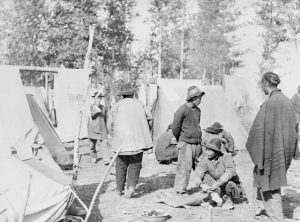This is a childhood story that I would like to share with everyone. For as long as I can remember, I have been told this story for countless times by my grandmother and parents in Cantonese. Seizing this opportunity of story-telling, I would like to try to reiterate this story in English.
That was probably one of the worst stormy night that I had experienced in my life. It was raining dogs and cats, with thunders and lightning rolling and stumbling across the sky. Little Christy looked into the shades of the red burning clouds, wondering when would this rainstorm going to stop.
It was late at night, probably around midnight, when I received a phone call from my mom. She was struggling her way to home as the whole public transit system was out of commission. She tried to sound jolly, but I knew that she was exhausted, and desperately wanted a cab to take her home. I can still remember the last remark of her call, “Baby Christy, it’s bedtime now. You should sleep now. Mama will be safe.” Then she suddenly hung up her phone.
Grandma just finished bathing when I finished my chat with my mother. She dried her hair while I was sitting on the windowsill, staring at nowhere in the sky. She hugged me in her arms and carried me into her bedroom. I hugged her back and left a good night kiss on her cheek. While tucking me in bed, she switched off the lights and began with my daily bedtime story.
“Christy, do you know why there would be curfews? Do you know why I told your mom to get home before midnight everyday?” Grandma murmured in a soothing tone, as if she was falling asleep. “Grandma, I have absolutely no idea.” Grandma then sat up and looked into my eyes as if they were diamonds in the dark, and said, “Christy, I am going to tell you a true story tonight…”
It was too a blustery midnight when a girl was alone on the walkway, heading back home. She was talking on her phone when she met a man coming out from a dark alley. She was too focused on her call, not realizing that the man was following her. It is her usual habit to walk through a park nearby her home as a shortcut during the night, though there is not even a lamp.
At the moment she stepped in the park, the man behind her patted her shoulder. Only realizing the presence of the man by then, she was terrified and rooted on the spot. She then heard his whisper, “Give me all your valuables!” The girl was so frightened that she did as he commanded, like a robot.
After a short while, when she finally retained her ability to talk, she put on a brave face, “Can I leave now…,” but before she finished her last phrase, the silent man silted her throat with a knife hidden in his sleeve. The wounded girl tried to scream for help, but ended up bleeding to death.
“The story stops here, Christy. You need to sleep now,” grandma commanded as she pulled up my little blanket. “But grandma, would this story happened to mommy?” Tears started to run down my face as I imagine her walking miserably under the umbrella, without any protection. “Grandma, I don’t like this story! Can you make me forgetting this story?”
Probably realizing this story might be too cruel for a 4-year-old kid like me, grandma paused for a while before she talked, “I’m sorry, Christy. Mommy will definitely be fine. However, for once a story, it cannot be called back. Once told, it is loose in the world.”
I could never forget this story in my life for this is the story that first presented the evil of the world to me, which could never be called back. This is how evil comes into the innocent world of mine.
Commentary:
- The idea of retelling this childhood story sparks off when I knew that we would be working on the topic of “How evil comes into the world”. Though I have struggled on the definition of “world”, I believe that there would be a world within each person, which, therefore, contributed to different stories.
- I found it extremely difficult to translate idioms and allegories from Cantonese to English, for the meaning might be same, but the frame of mind could differ a lot. I may regard this as a hindrance in bringing the minorities’ stories under the spotlight of mainstream culture for the stories of theirs might not be able to convey or portray thoroughly. (This may be a sign of Eurocentric dominance over other cultures, as English is now the dominating language on earth.)
Works Cited
Poon, Stanley. A Lightning Moment in Hong Kong. 4 May 2012. National Geographic Traveler Photo Contest2012. National Geographic, Washington, D.C.
